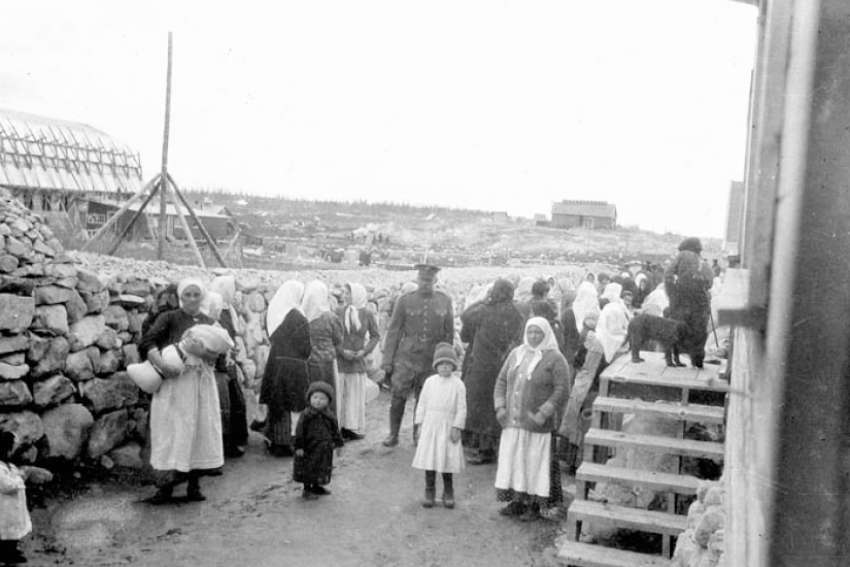A university professor from Kingston, Ont., wants to make sure it doesn’t happen.
Lubomyr Luciuk, a professor of political geography at the Royal Military College, has initiated an online petition that he hopes will prompt the federal Heritage Minister to “do the right thing” and restore the cemetery.
“The government of Canada, between 1914 and 1920, under powers of the War Measures Act, interned 8,759 men, women and children in 24 camps,” said Luciuk, who initiated the e-petition on April 17, sponsored by Conservative MP James Bezan.
Many of those interned were Ukrainians who had immigrated from the Austro-Hungarian Empire, Luciuk said. They were sent to remote camps, among them Spirit Lake in the Abitibi region of Quebec near the town of Amos. It was one of 24 camps across Canada and one of only two that also housed women and children.
During the internment years, at least 16 burials were done at Spirit Lake. In 1936, the federal government sold the land to Quebec, which sold it to a farmer in 1988. Over the years, the cemetery has been allowed to be overtaken by the area’s boreal forest.
The Ukrainians sent to Spirit Lake came primarily from Montreal and many were Ukrainian Greek Catholics who attended the St. Michael the Archangel Greek Catholic Church.
Most Canadians do not know Ukrainians were interned during the First World War, and afterwards during the 1917 Bolshevik Revolution in Russia, Luciuk said.
Luciuk began to research the internment in 1978 while working on his master’s degree at Queen’s University.
In the mid-1980s, the Ukrainian Canadian Civil Liberties Association formed to gain recognition of the internment, based on the recognition given to the Japanese who were interned during the Second World War, he said.
In 2008, they achieved a settlement that established the Canadian First World War Recognition Fund, and $10 million of “symbolic redress,” Luciuk said. This fund has a formal mandate to restore internee cemeteries, and has successfully done so in other locations.
Luciuk said he spoke to a woman who survived the Spirit Lake internment and she told him that if people had remembered what had happened to the Ukrainians during the First World War, the Japanese might not have been interned in the next world war.
“Some died trying to escape, others died of work-related injuries,” said Luciuk.
“We thought it would be a simple matter for the landowner to open up cemetery to be re-consecrated,” Luciuk said, noting that almost all the crosses have now been knocked over or disappeared.
He attributed “no malicious intent” to the farmer, but described the cemetery as “in the back end of nowhere.”
“He’s a farmer, he’s not interested in maintaining a cemetery,” Luciuk said.
They approached the farmer several times, offering to pay for the land or an honorarium for hiring a caretaker, Luciuk said. “All we want to do is acquire the property, restore the cemetery, have a ceremony. … We are not interested in opening it up to the public, except maybe one day a year.”
The Spirit Lake Camp Corporation runs a small museum near the internment site that tells the story of the camp.
Luciuk has written the Bishop of Amos and Pope Francis asking for their support in restoring and re-consecrating the Spirit Lake cemetery.
“This is such a simple matter to solve,” Luciuk said, noting there’s an endowment fund that can pay for the cemetery’s upkeep.
The e-petition (No. 1643) can be found online at petitions.ourcommons.ca.
The fight to bring Ukrainian internee cemetery back to life
By Deborah Gyapong, Canadian Catholic NewsOTTAWA – The graves of at least a dozen Ukrainians who died while interned in a remote camp in Quebec during the First World War are slowly fading into the forest landscape.
Please support The Catholic Register
Unlike many media companies, The Catholic Register has never charged readers for access to the news and information on our website. We want to keep our award-winning journalism as widely available as possible. But we need your help.
For more than 125 years, The Register has been a trusted source of faith-based journalism. By making even a small donation you help ensure our future as an important voice in the Catholic Church. If you support the mission of Catholic journalism, please donate today. Thank you.
DONATE

